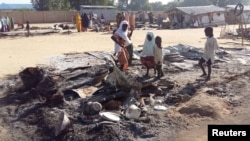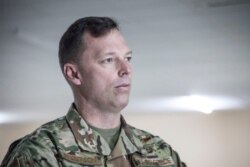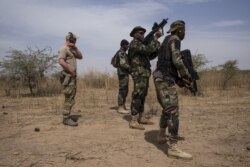As a pandemic rages and weakens fragile societies, terrorists lie in wait to pounce on vulnerable people, especially on the African continent, says a top U.S. military commander. U.S. military officials say their work on the continent has continued unabated, but that extremists are actively seeking every opportunity to gain a foothold, from Senegal to Somalia.
Violent extremist organizations, or VEOs, are seizing on Africa’s coronavirus chaos to advance their goals in vulnerable societies, from Nigeria to Mozambique, says the head of U.S. Special Operations Command Africa, Maj. Gen. Dagvin Anderson.
He spoke to reporters via Zoom video conference from AFRICOM headquarters in Stuttgart, Germany.
“I do believe the extremists will look to exploit any opportunity they get, and COVID presents those opportunities, because COVID stresses any government. ... we know the governments and the nations of Africa are also feeling that stress, and the VEOs will look to exploit that. I can't tell you exactly how, because that will manifest itself in different ways in each of these countries. But these VEOs are very dynamic and they're very flexible, and they will look to see where those weak points are, where that can be exploited, and they will go after it,” he said.
In West Africa, Islamist extremists have shut down educational systems — Anderson cited more than 3,000 schools shuttered by extremist groups in Mali and Burkina Faso. In the Democratic Republic of Congo, Central African Republic and Mozambique, they’ve harnessed local grievances to feed their activities.
And, he said, some of these groups count on foreign assistance from mercenary groups with murky affiliations. The shadowy Wagner Group is thought to be active in as many as 20 African countries, including Mozambique, Libya, Sudan, the Ivory Coast and the Central African Republic.
Anderson echoed analysts who believe the Wagner Group is closely connected to the Kremlin, a charge the Kremlin has denied.
“Russia is directly engaged with them. I see them as being very corrosive. I see them as being detrimental to what should be a common international threat. Unfortunately, what we see is they're fueling the conflict in Libya. To say that that is a private military contractor, I think, is a bit of a stretch, because they are bringing in weapons systems that we saw recently reported in the press that private companies just don't have access to. Those are state-provided weapons systems.”
Anderson also touched on the recent announcement that U.S. Africa Command headquarters would move out of Germany, to another European nation. He noted that the disruptions of the coronavirus crisis didn’t change or diminish U.S. operations in Africa, and reasoned that a change of headquarters would have little effect on their work.
What worries him more, he said, is the pandemic’s disastrous effect on government services and institutions in Africa. And, he noted, the military’s role is limited, and often too late.
“We are often the firemen, that if you're calling the firefighters it means the fire has already broken out and that we need to do things to do fire prevention and we need to be able to cut firebreaks to keep that fire from spreading. So while I appreciate everyone's interest in what the military brings, if you're ringing the fire alarm, it's probably a little late. We need to do things ahead of it in order to prevent,” he said.
Right now, the American general said, families and communities across the world face uncertainty and fear as the coronavirus continues to spread. A military solution alone will not address their needs for food security, schools, decent health care, and basic government services. Some extremist groups say they arose specifically to address those injustices — but, Anderson said, their violent methods are a dead end.














